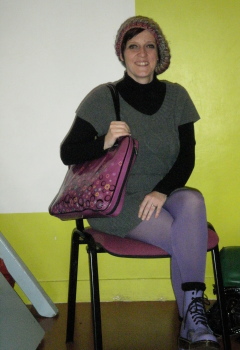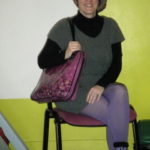To make theater accessible to everyone, regardless of age, disability, origin, or social status, Isabelle Warnaar recently created the ATEV association (Association Théâtre En Vie). At the same time, she is involved in many activities. Meet a passionate theater enthusiast brimming with energy.

With her purple tights, lilac Doc Martens, and pink handbag, she doesn’t go unnoticed. Perhaps a way for her to break away from clichés and stereotypes. She? That’s Isabelle Warnaar. In fact, when she was younger, she already expressed her uniqueness. The school environment did not suit her. After obtaining her BEP/CAP in sales, she set out to conquer the new world: “I wanted to discover the United States, it was my dream.” There, she successfully earned a degree equivalent to a DEUG in English: “I graduated first. When I decide on the studies I want to pursue, it usually works out well.” Returning to France two years later, she settled in the capital and became an assistant director for the show “Notre-Dame de Paris.” It was at a party with the troupe that she started singing. At 20 years old, she became aware of her vocal power. A gift she would cultivate by taking opera singing lessons near Toulouse, all while continuing to work as a sales representative. In 1995, she became a Niçoise at heart, and the artistic world followed her: while part of the theatrical company “Dell’ Arte,” she began a career as a theater teacher at the association La Semeuse in Old Nice. A creator at heart, she later founded her own company “Métamorph’ Théâtre.” She also met her husband, and together they formed the jazz trio “Voice and Fingers” while continuing to work at La Semeuse.
At 39, she leads a full life: she is a singer, actress, theater teacher, and works as a cultural animator in a retirement home. But that’s not all: she is also the secretary of the Collectif des Psychothérapeutes des Alpes-Maritimes and is part of the association “Les Ouvreurs,” behind the gay and lesbian festival “In&Out.” She studies at the IEPA (European Institute of Applied Psychology) to practice art therapy, which she discovered three years ago. A profession that was a revelation for her. How does she manage all her activities? Even if she sometimes reaches a state of stress, she humbly responds: “I need to work. What I do now is a way of life. My work is my balance.”
The ATEV Association: the “latest addition”
To be able to give theater lessons at the UACN (Union des Aveugles de Corse et de Nice), she recently created the ATEV association (Association Théâtre En Vie). The idea for this entity, she owes to Martine, whom she thanks. “Five years ago, I was teaching classes for teenagers. A desperate mother came to see me with her daughter with Down Syndrome. She wanted her to develop outside the CAT (Center for Work Support). All theater teachers except for the CATs refused to take her,” she recalls. Not afraid of disability, she decided to give this student a chance to attend theater classes. “Honestly, she was one of my best students with her ability to learn texts and work on emotions. She wasn’t afraid of being watched by others.” An obvious conclusion: children, teenagers, and adults with disabilities can integrate into a regular environment.
The goal of the association? To allow everyone to access theater workshops, regardless of age, disability, origin, or social status. This is complemented by the use of art therapy as a means of expression, creativity, and well-being. Since her work fits into a therapeutic perspective, she also heavily references the theories of the famous Swiss psychiatrist Jung, her mentor who worked on balancing emotions, thoughts, sensations, and intuitions. “In my theatrical work, I want to help people experience these four functions and help them rebalance them.” Explanations: “for example, when a teenager works a lot with the mind because he doesn’t have easy bodily control, I will try to rebalance the body and mind through theater and exercises.”
The other challenge she set for herself? “Helping people work on their emotions, find their resources, surprise themselves, and help them gain self-confidence.” Practicing theater constitutes therapy. The mirror effect is induced. Certainly, the characters are caricatured, but in reality, they resemble us. Director, producer, and screenwriter Alfred Hitchcock wrote: “Theater is life; minus the dull moments.”
Since she started giving theater lessons to the visually impaired, Isabelle Warnaar also recognizes the therapeutic function of her teaching on herself: “I’ve always been afraid of losing control. It teaches me to give space to others.” A necessary release for human evolution. By working on herself, she has become much less demanding: “I am less demanding about a play, which may have helped me to be a little less demanding with myself.”
The ATEV association claims its total open-mindedness: “there is no abnormality. Everyone is different, of course, but everyone is normal.” The demand involves children, teenagers, the elderly, and disabled people alike. “It will never close its doors to anyone who wants to take theater lessons regardless of their differences!” It registers a real desire to bring a certain autonomy to disabled people. It is simply an association imbued with profound humanity.



